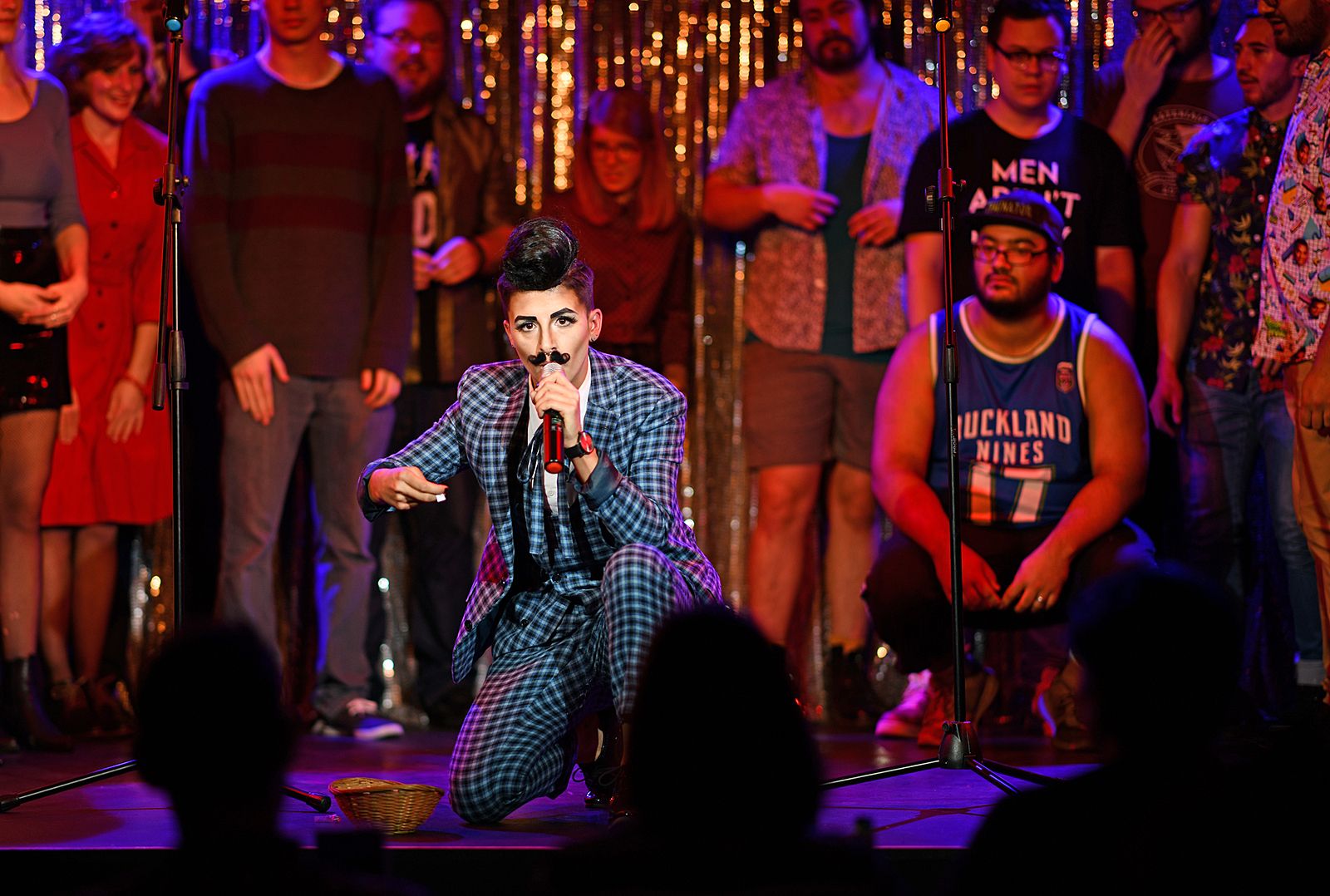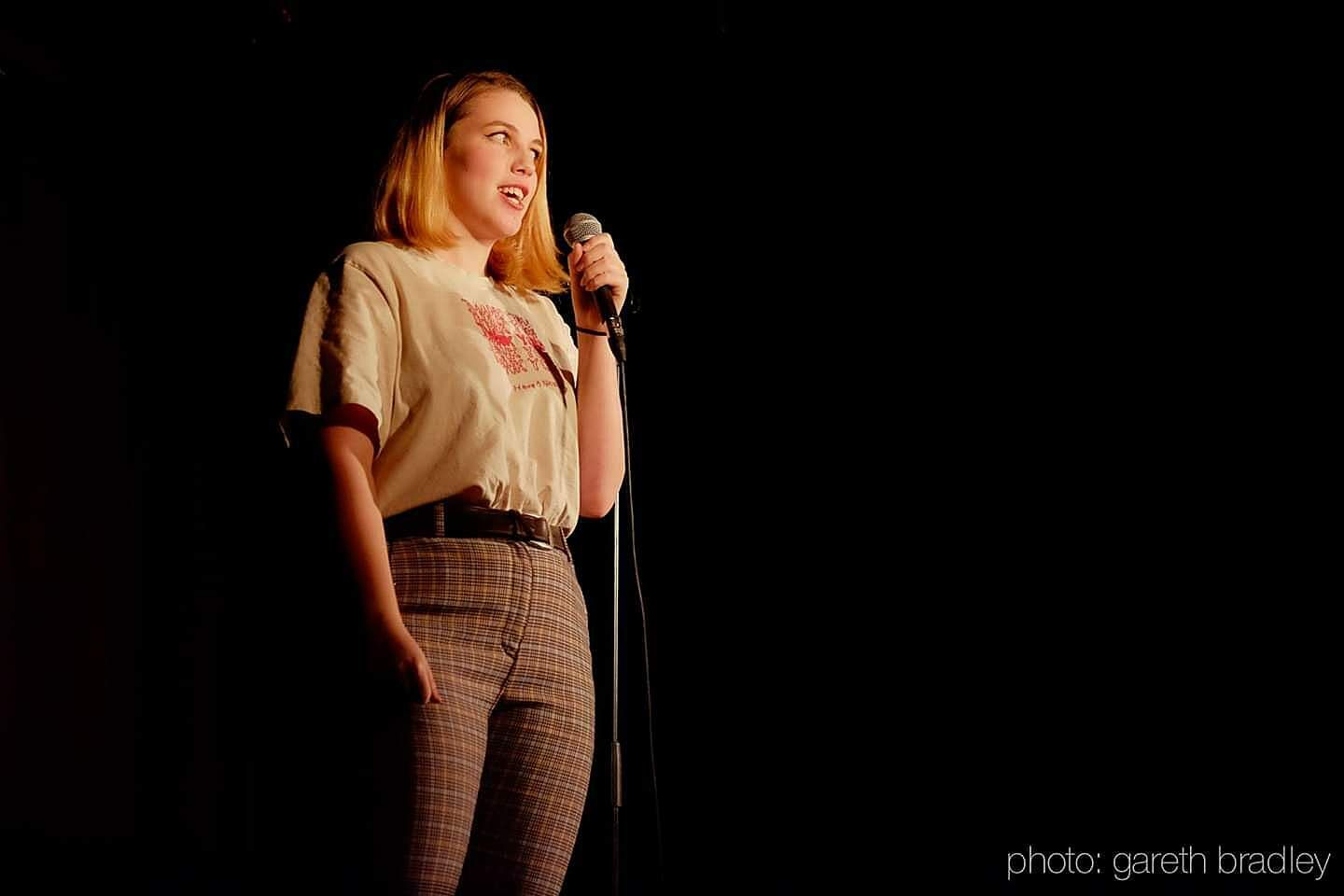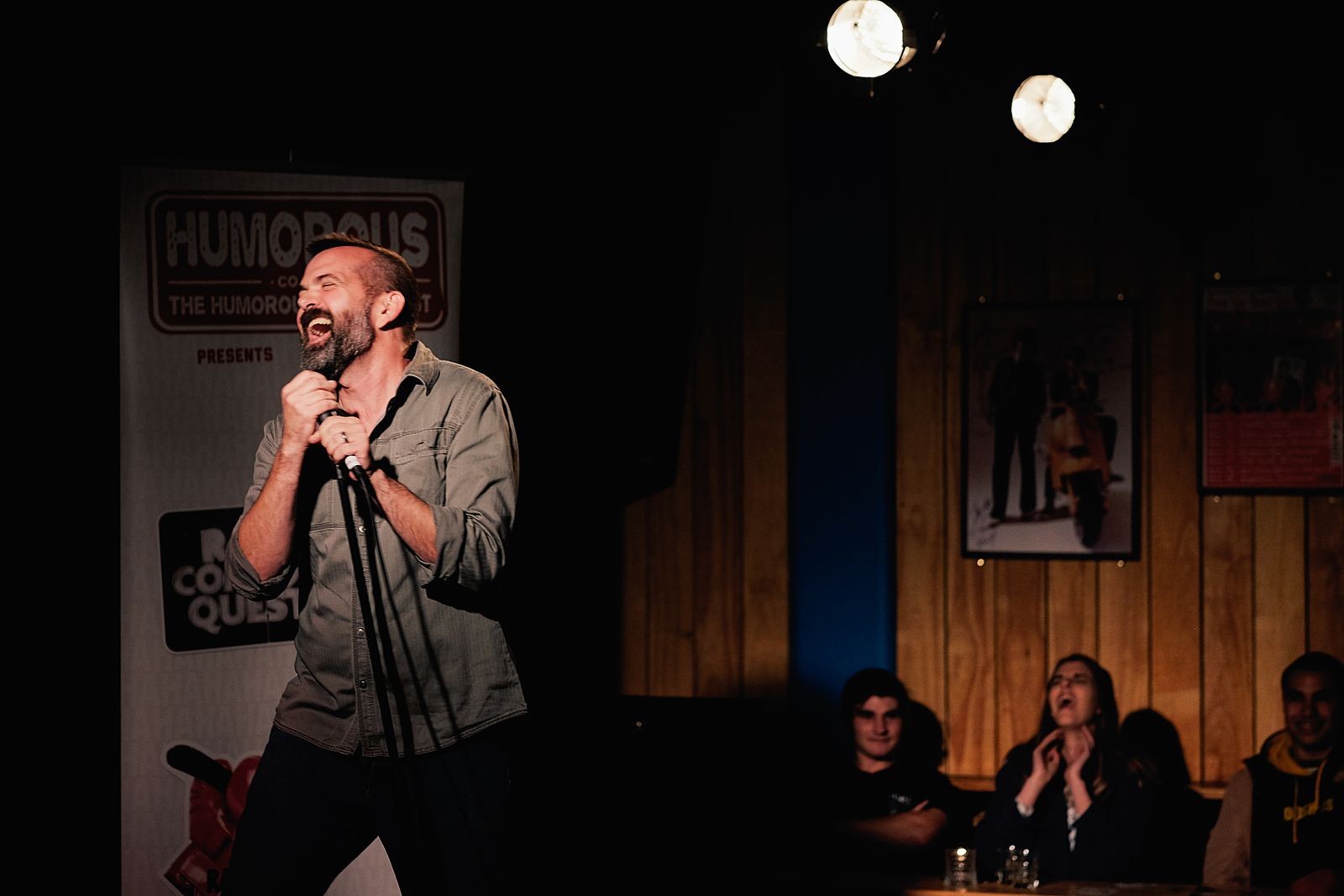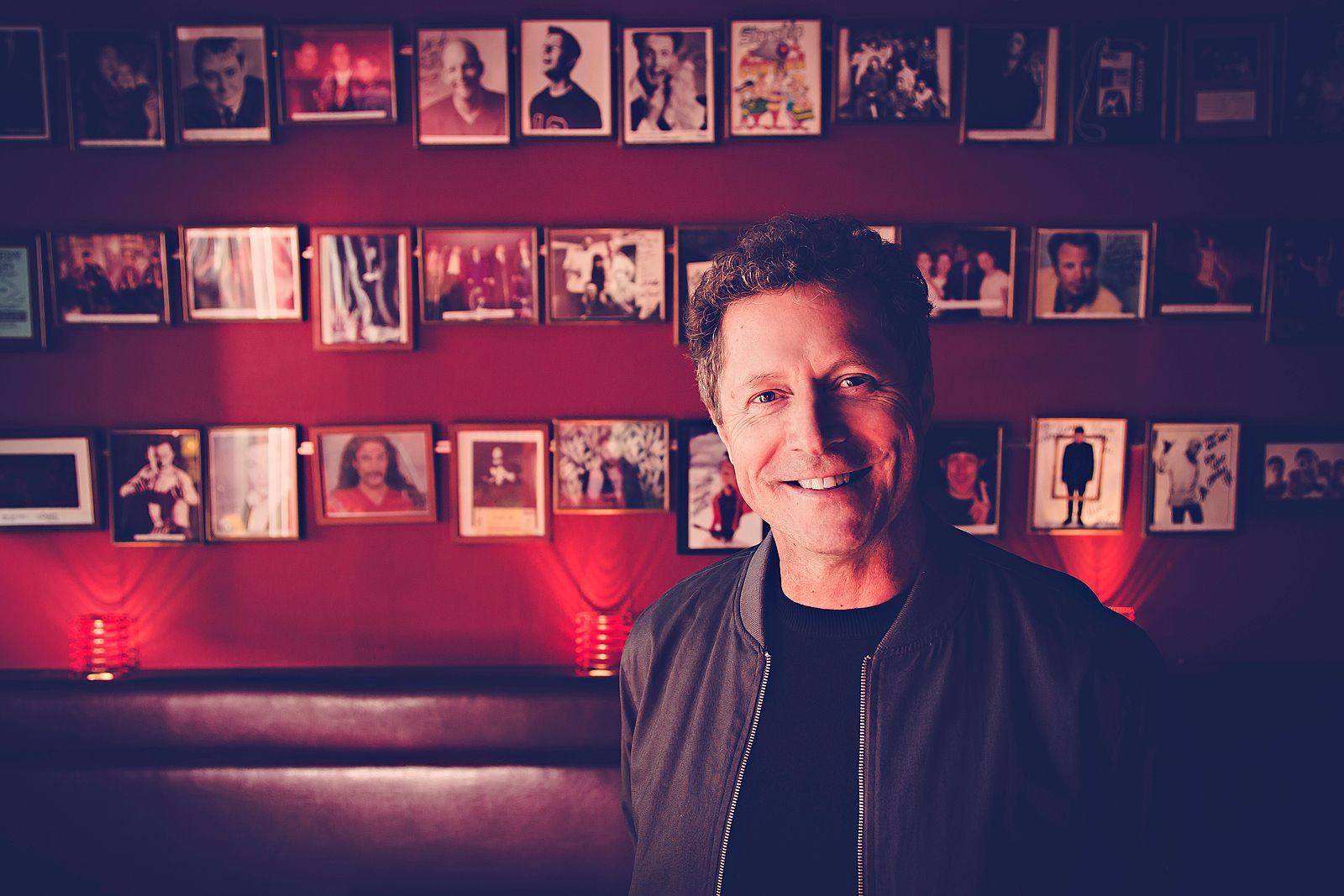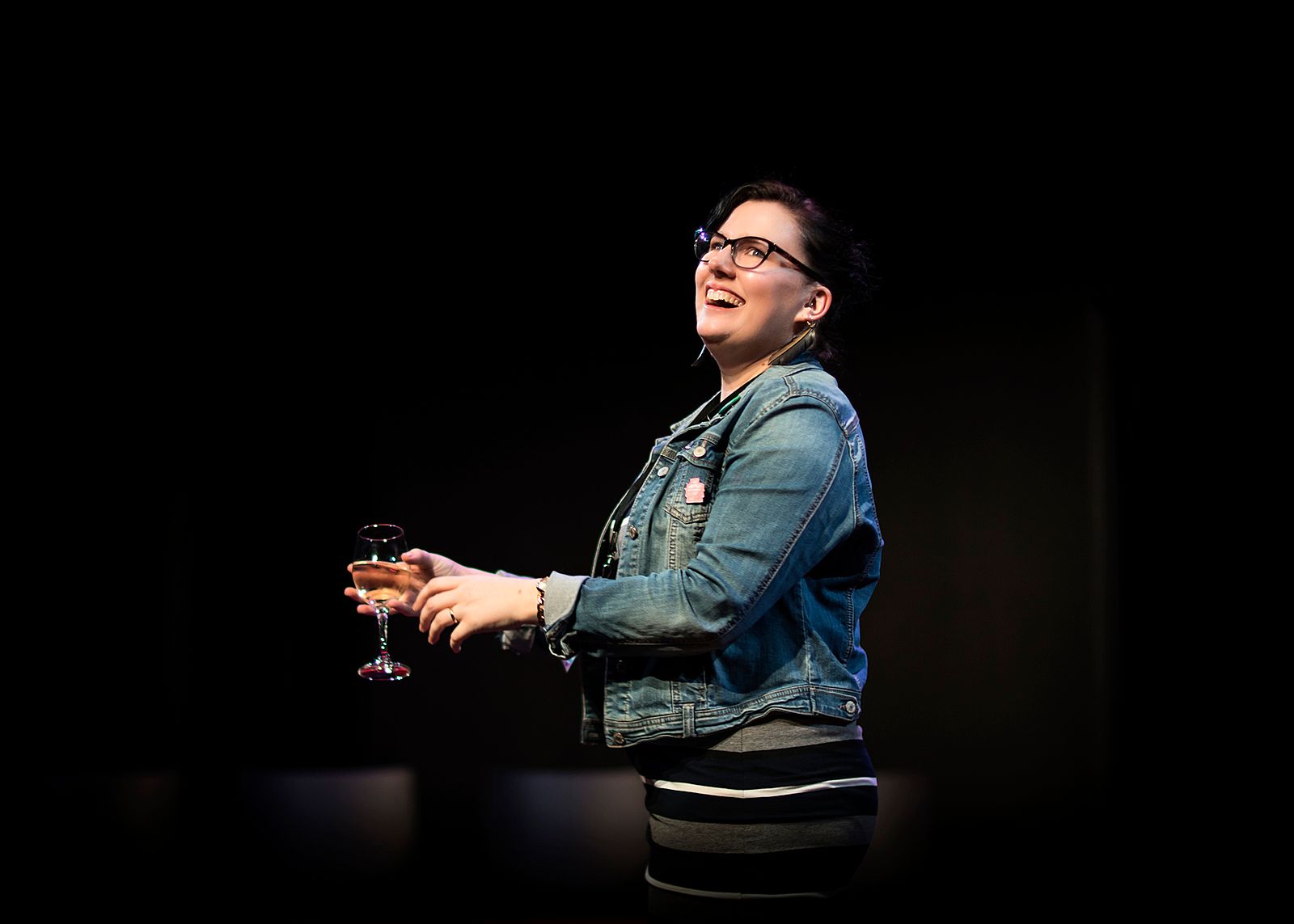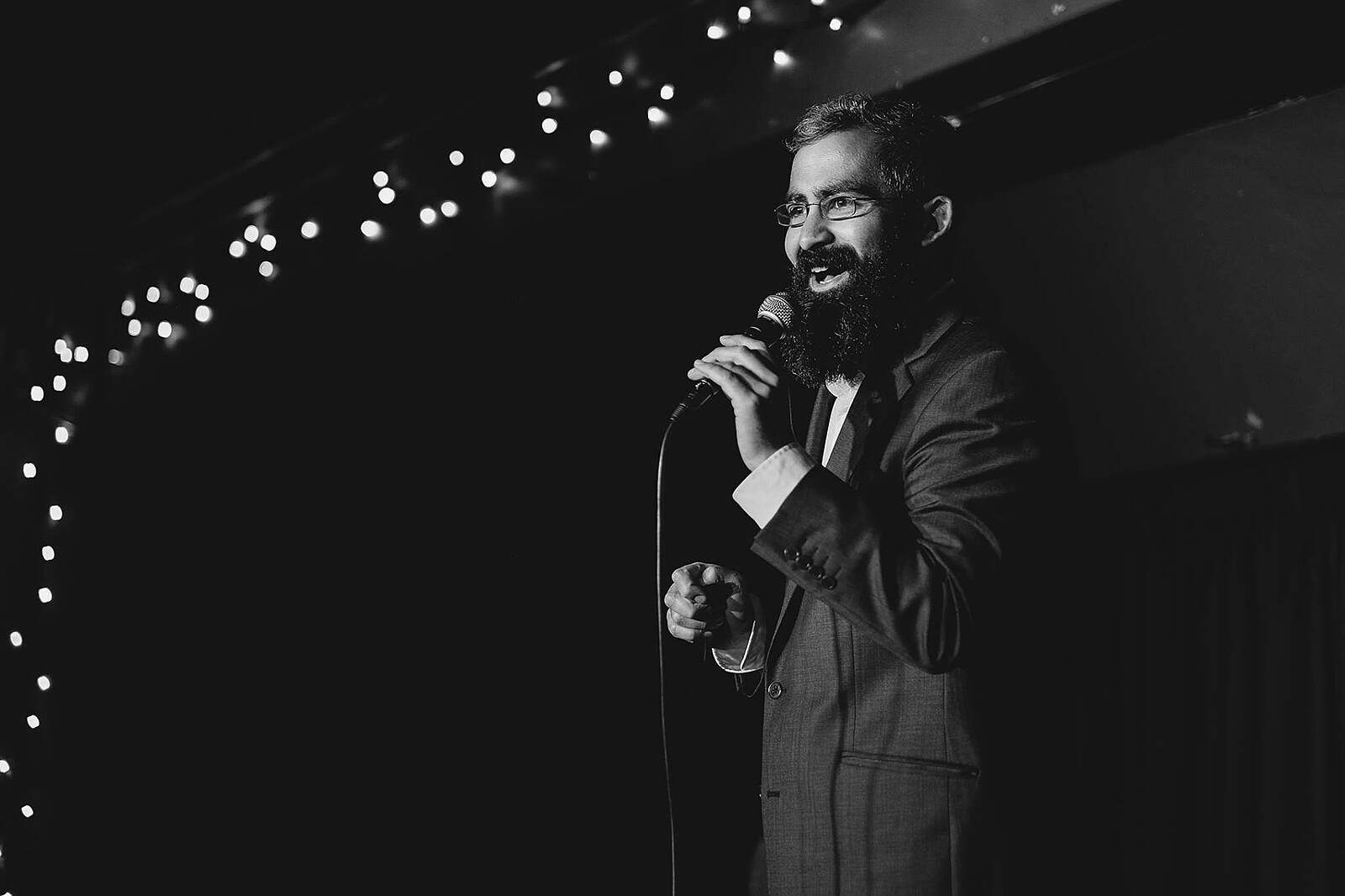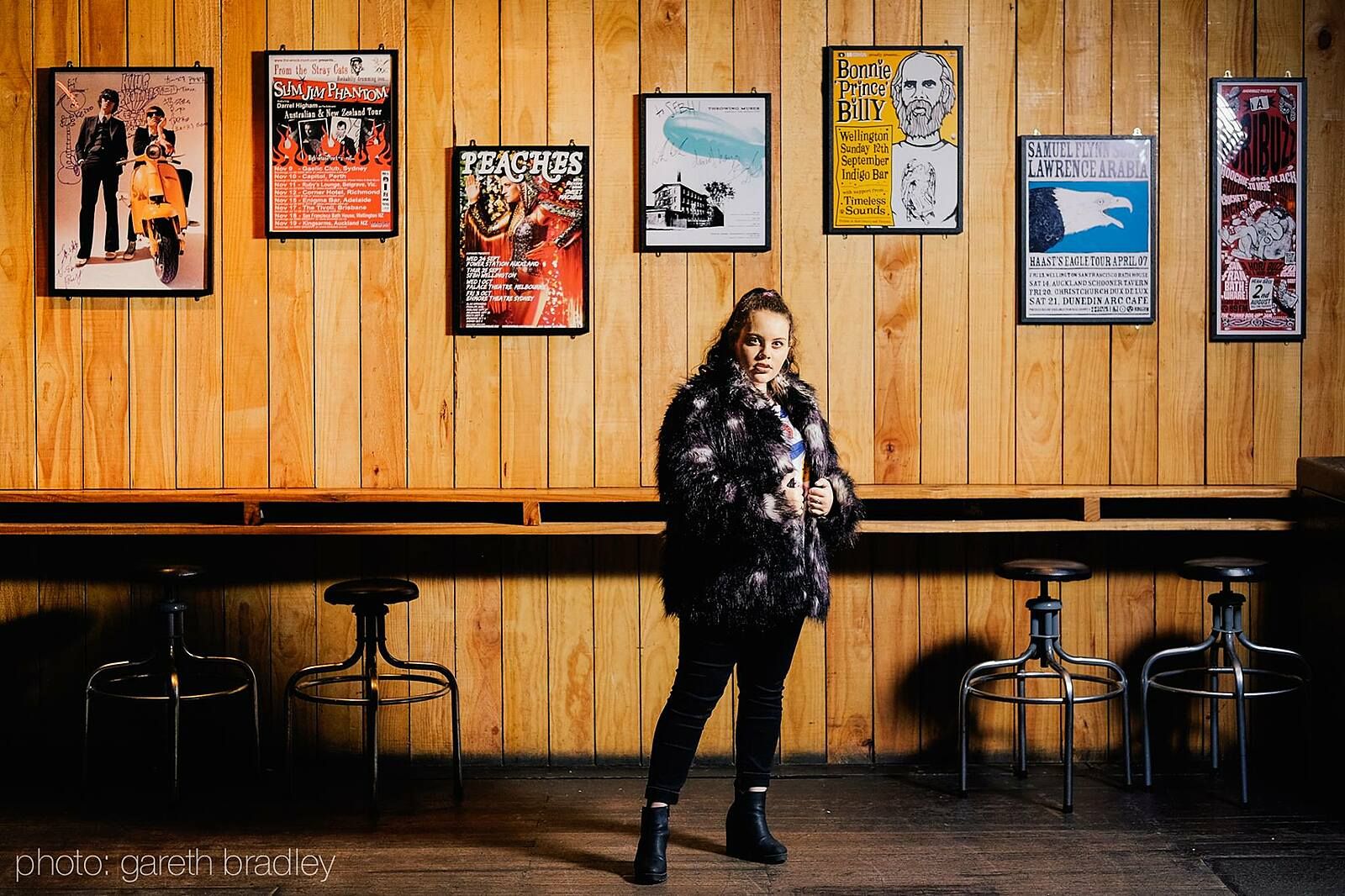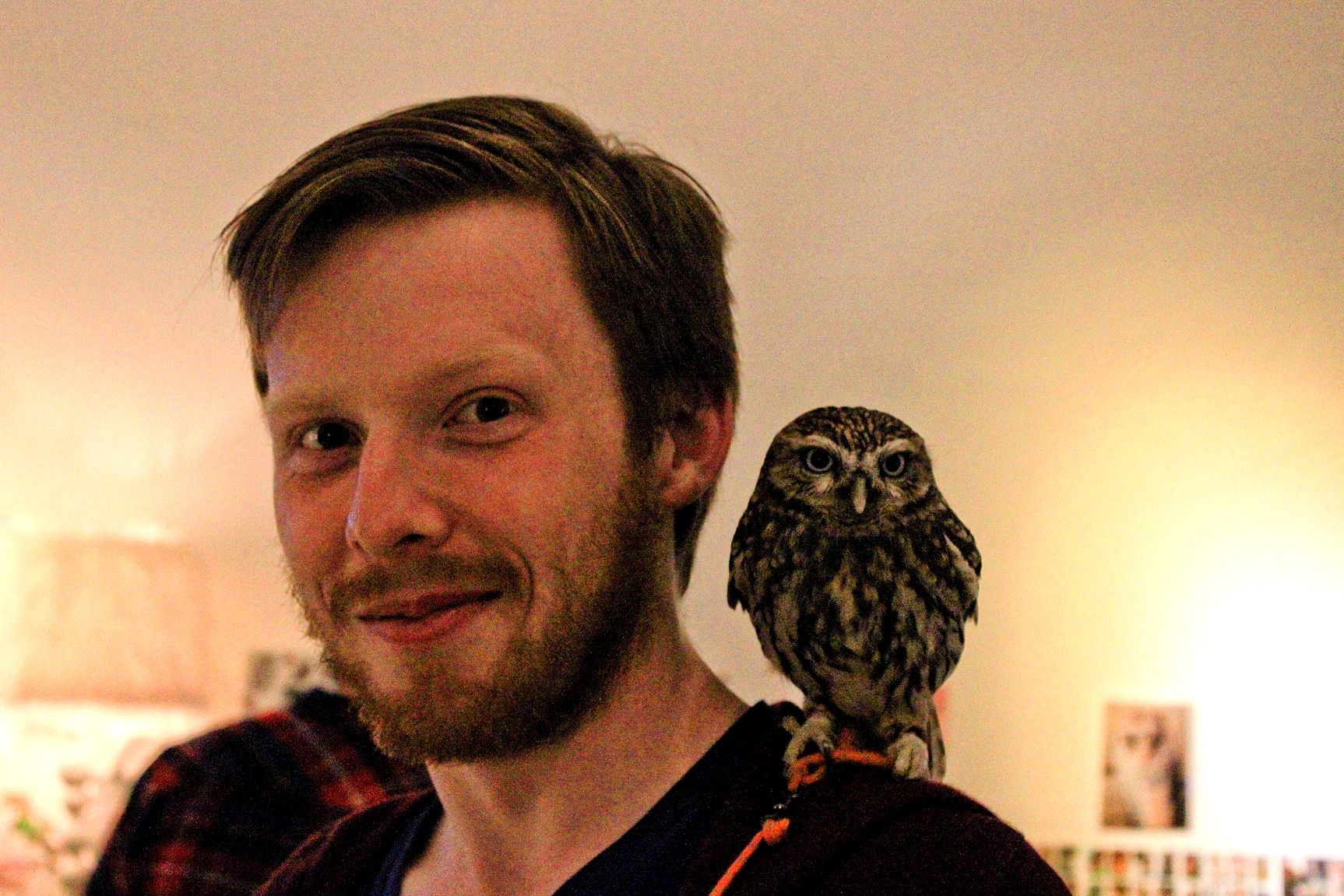Just Jokes: On Offensive Material and Accountability in New Zealand Comedy
Adam Goodall digs into what happens when comedians cross the line.
Adam Goodall digs into what happens when comedians cross the line.
Content warning: this pieces contains descriptions of sexist, racist and transphobic jokes.
As long as there’s been stand-up comedy, there have been offensive jokes. And as long as there have been offensive jokes, there’s been discourse and debate about them – what’s acceptable, what isn’t, when drawing a line turns into an act of censorship.
Over the last few years, though, there’s been a seachange in the way that the New Zealand comedy community talks about these jokes. There’s a growing awareness that it’s not okay for a comedian to bust out a broad Asian accent and squinty eyes when she’s doing a bit about her Thai masseuse; that it’s kind of gross to ask a woman from the audience to sit on a stool and then sniff it when she gets up; that it’s a problem when a young man gets up at an open mic night and does a set about beating up homeless people, or a set about how traumatising it must be to Nemo (yes, the clownfish) that his dad (again, a clownfish) can change sex.
There’s also a greater awareness that those jokes hurt. George Fowler is a Wellington promoter whose popular comedy events include the New Zealand Pun Battle Championships, the Carnage Comedy Show and A Comedy Show With Good Comedians In It. When a comedian tells a joke that targets someone for their race, disability or gender identity, for example, “they’re contributing to power structures which cause real-world harm,” he says, “and they also cause real-world harm to the person sitting right in front of them.”
Jokes that target audience members like this can be particularly damaging for a promoter like Fowler, who produces a lot of shows for women and gender-diverse audiences. “What I’ve noticed is that they’re… anxious, they’ve been hurt previously. So it’s hard to get certain groups of people to turn up to shows targeted at them, and we’re at a stage where we’re fixing harm.”
Scott Blanks is the director of The Classic in Auckland, the only dedicated comedy bar in Aotearoa following the closure of VK’s Comedy and Blues Bar in Wellington in 2017. Blanks estimates that women make up around 60 percent of The Classic’s audience, and he agrees that jokes like that can keep potential audience members away. And if you’re losing audience members? You’re losing business.
These jokes are also harmful to other comedians, making them feel isolated and powerless in a community that they’re supposed to feel safe in – a community that’s more diverse than ever before. Jerome Chandrahasen, a trustee at the Humorous Arts Trust and arguably its most public face, organises the Trust’s Raw Meat Monday open-mic nights and works directly with a lot of the city’s comics, new and established. In the last decade, with more regular gigs and regular promoters, he says the industry has been able to attract a more diverse range of comedians than the usual “young guys without a mortgage, without kids.”
But that shift doesn’t mean much to someone the moment their identity is targeted or mocked by another comedian in front of an audience. “If someone does something offensive on stage and they come backstage and [you hear] all their mates being like, ‘you killed it out there, that was sick’… that can be when comedy starts feeling a little bit lonely,” says Janaye Henry, winner of Best Newcomer at the 2017 Wellington Comedy Awards.
2018 Raw Comedy Quest Wellington finalist Tui Christie remembers a workshop gig she did before last year’s Comedy Festival. “Someone got up on stage and made a joke about molesting teenagers,” she recalls. “The fact that some of the audience still laughed at the joke made me feel angry and unsafe,” she continues. “I was a 17-year-old girl, in a bar at nighttime, in the midst of these people laughing about teenagers getting molested.”
“I stopped because I just got tired of having to try to fit into a space that wasn't making me feel welcome or safe.”
“I think the worst I’ve felt in an audience is I saw a white comedian do an ironic haka on stage,” says Henry. “I felt deeply uncomfortable, and I looked around and went, ‘oh, there are really no brown people in this room’.”
That isolation, that feeling of being unsafe, can push comedians to leave stand-up. Alice May Connolly is an actor and one of the stars of The Mournmoor Murders, a loony, character-heavy two-hander that premiered in this year’s Comedy Festival. Connolly was a regular in Wellington’s stand-up scene from 2014 to 2016, and during that time she “constantly” encountered bigoted and offensive jokes. “Oh my god, you couldn't get through a night without someone saying something awful.”
“I talked about it with other comics,” she says, “but definitely didn't confront them myself.” She was new, trying to hustle, unprepared to play the role of advisor to every comedian making jokes that were sexist or abusive. “I stopped because I just got tired of having to try to fit into a space that wasn't making me feel welcome or safe,” she says. “Too much effort was going into 'fitting in' rather than the actual work of stand-up.”
Connolly’s situation isn’t unique. In her 2019 New Zealand Fringe show HarleQueen, for example, Dunedin comedian Abby Howells tells the story of how she walked away from stand-up comedy after a pile-up of incidents in which she was the target of abusive and bigoted behaviour by other men, from her ex-boyfriend to other comedians in Dunedin and elsewhere.
Offensive jokes, harmful jokes, are a labour issue and a business issue: they’re bad for the workers and bad for the customers. Almost everyone I talked to agreed that they warranted a stronger, more active response than a ‘conversation’. But despite this, Fowler says, “in lots of respects, fuck-all has changed.”
One of the obstacles to actual change is that ‘almost’ in almost everyone. There are still people, albeit a minority, within the community who disagree that there’s a problem still to be solved. There are the people who think there is a problem, and then there are the people who think that the people who think there is a problem are the problem.
That’s best exemplified by an interview between Leah Panapa and veteran comedian Andrew Clay on Panapa’s late-night show on Magic last December. Clay gets straight into it: “Comedy has often been used to show the truth and make light of the truth,” he says, and attempts to make certain types of joke off-limits for comedians are “fascist, right-wing” censorship.
Clay acknowledges that there was some material, in the past, that needed to be acted on. “Comedians would come out and do jokes about the Pakistanis next door,” he explains, “some pretty horrible, racist stuff, and it needed to be corrected.” But “the pendulum has swung way too far,” he says. “You get to the point where, if you bring up a joke which has race in it, certain people will shut off their minds and call it racist before they’ve even heard the joke.”
“People think that talking about it is enough, and I don’t think it is because there’s never a plan of action, there’s never any change.”
Even amongst those who agree that there is a problem, though, there isn’t necessarily agreement on the best way to solve it. “Conversations are always being had in the comedy community,” says Henry. “But people think that talking about it is enough, and I don’t think it is because there’s never a plan of action, there’s never any change.”
Fowler points to open-mic nights as a perfect example. Too often, he says, these nights are free-for-alls, a platform for jokes that are, “by all mainstream standards, unacceptable.” “Every week, the same guys will come back and do jokes about killing hookers, and their slutty girlfriends, and how they’re a nice guy, and some dodgy racist shit, and kiddy-fiddling shit,” he says. “That sort of shit even makes it to the Raw [Comedy Quest] heats.”
Fowler says that the main problem is that there’s been no real community investment into changing the status quo. “These jokes continue to exist,” he says, “because of a lack of commitment, a lack of tools, and a lack of agency by producers and organisers to do any of what you would you call gatekeeping.” That’s why “fuck-all” has changed, he says. Industry and community figureheads aren’t actively shutting this stuff down, and comedians further down the ladder aren’t being equipped with the tools they need to push back against this stuff.
But who does the responsibility actually lie with? And what, if anything, can they do to push back?
Some comedians say that it’s the responsibility of individual comedians to change their own outlook. If you, a young white man, are unsure whether you’re all good to do your bit about an Indian dairy owner, just look at the comedians you’re performing with and the audience you’re performing to. Take note of the context, listen to your audience, listen to the people around you.
“You will often face somebody getting up out of a crowd [in response to a bigoted joke], and saying, ‘no that’s not okay’, and you’ll have to face that particular consequence,” says Neil Thornton, a comedian and the founder of Wellington’s New Zealand Comedy School, the country’s only comprehensive stand-up comedy course for adults. “Or you’ll get a boo, or a hiss… that’s part of the consequences of saying what you’ll say. People will laugh, or they won’t.”
But whether an audience laughs or not is hardly a reliable litmus test. Audiences laugh for all sorts of reasons, says Jennifer O’Sullivan, a former Wellington stand-up and now the director of the New Zealand Improv Festival. “They’ll laugh because it’s genuinely funny, they’ll laugh because it’s their friend and they’re laughing at their friend, they’ll laugh because they’re shocked and embarrassed, or they’ll laugh because they think everybody else is laughing and they’d better laugh too. It’s extremely rare that an audience will not laugh and for it to be clear why they’re not laughing,” but a comedian has to discern whether their joke was not funny or not okay through that ambiguity.
“One audience on one night is not actually the barometer,” says Jamaine Ross, an Auckland stand-up and member of the Fred Award-nominated sketch comedy group Frickin Dangerous Bro. “If a comedian says something offensive and the audience laughs, that doesn’t mean the thing isn’t offensive and it’s funny. It just means people didn’t find it offensive and did find it funny that night.”
“If I’m MCing a Raw night, a rookie night, and a comic comes out and they say something racist or homophobic, I will come on afterward and say, ‘That was some racist-ass shit!’"
Individual accountability, then, comes from the comedian recognising a pattern across several shows and several audiences. This is an imperfect form of accountability, though: to notice the pattern, the comedian has to keep doing the joke, potentially hurting people in the process.
How about MCs? The comedians who host line-up nights, who come out after each six-minute set with a joke and the name of the next comedian – what’s their responsibility? Jan Maree, a now-retired comedy veteran and the Kaiwhakahaere for the Comedy Festival’s Class Comedians programme in Auckland from 2002 to 2007, says, “[The MC is] the person who has to make that environment right for the comedians to do the best job they can.”
That means it’s the MC’s job to create a good atmosphere for everyone. It also means it’s their job to relieve tension if there’s heckling or unrest in the audience – or if a comedian steps out of line. “If I’m MCing a Raw night, a rookie night,” Ross says, “and a comic comes out and they say something racist or homophobic, I will come on afterward and say, ‘That was some racist-ass shit!’ I will tell the audience that was fucked, and then the audience will feel much more comfortable: ‘Oh, someone knows this is not okay.’ It clears the space.”
A number of comedians told me, on and off record, that they respond in a similar way if a comedian on a line-up launches into an offensive routine while they’re acting as MC. Others, though, were uncomfortable with the idea of acting as the gig police. “I MC’d A Comedy Show With Good Comedians In It recently,” O’Sullivan says, “and one of the performers did some material that, backstage, we were like, ‘Oh, that’s a bit off – that’s walking close to the line of racism there.’ And I didn’t say anything to her, because [as an MC for hire] I didn’t feel like I was in a position to be, like, ‘Hey, let’s talk about that joke.’”
In Auckland and Wellington, MCs for line-up nights are often senior comedians, people with several years of performing under their belts. Is it possible that they could act as coaches for the night instead, sitting down with new comedians after a show and providing feedback on a regular basis?
That’s not really practical, says Chandrahasen. Between managing the audience, maintaining a good vibe in the green room and performing your own material, it can be difficult to find the time to pay attention to everyone’s set, let alone compile notes for feedback.
“Sometimes in Auckland, they’ve had a senior comic sit in the back of the room at a Raw Monday, and they’re deliberately there just to take notes and give feedback and advice,” Chandrahasen says. “We do that at Raw Comedy Quest [in Wellington] as well.” But these are donations, he adds – Humorous Arts Trust simply doesn’t have the money to make them a regular installation at each Raw Meat Monday.
The Comedy Festival’s Class Comedians programme in Auckland and Neil Thornton’s New Zealand Comedy School in Wellington offer opportunities for new comedians to learn the ropes and develop their voices, and both programmes emphasise the importance of ‘punching up’ instead of ‘punching down’ – that is, not targeting vulnerable or marginalised communities with your comedy. The vast majority of Thornton’s students get the message, he says, but in the handful of cases when they punch down, he can only intervene in their material up until their graduation show. After that, he says, “I have to let people fail for themselves.”
"Codes of conduct are only as strong as the people you’ve got exhibiting those things.”
Which brings us to the top of the hierarchy: the producers, organisers, venue managers and other senior comedians. Many of these figures are doing good work to try and keep performers safe. Auckland-based comedian Emma Wollum, national runner-up in the 2017 Raw Comedy Quest, points to the work of people like Amanda Kennedy and Livi Mitchell – better known as The Fan Brigade – who started the ride-sharing service Get Me Home NZ so that women and gender-diverse people in comedy could get home safely after gigs.
A number of producers and organisations have also implemented codes of conduct over the last few years. Organisations like the New Zealand Comedy Guild, the Humorous Arts Trust, the New Zealand Comedy Festival, the New Zealand Improv Festival and Hugo Grrrl's Gigs have codes of conduct that identify acceptable and unacceptable behaviour on and off stage, and most include details of the processes that the organisation will follow if a comedian feels unsafe and needs to make a complaint.
Other organisations and venues, like The Classic, rely on more informal measures and procedures. “[We have] an implied code of conduct,” Blanks tells me. “People are given, I suppose you could say, a ‘three strikes and you’re out’ kind of thing. That happens less in regards to what’s been performed on stage and more to do with behaviour off stage.”
“This is a complex area due to the range of shows that we offer as a dedicated venue,” Blanks explains in a later email, “with performers that range from first-time unknown rookies through to local and international headline acts.” This ‘three strikes’ approach is intended to let Blanks and his staff respond to offensive material and behaviour in a way that’s flexible and context-sensitive.
All of these processes, whether they’re written down or not, ultimately rely on one of the other performers making a report, Blanks says. But a performer might not report misconduct off stage or harmful material on stage if they’re not confident in the reporting process – or, for that matter, if they’re not even aware it exists. Some comedians I spoke to were unaware that these codes of conduct were in place, let alone that they contained processes for reporting misconduct and harmful material.
“If I had a real significant problem, the Comedy Guild is the first place I would go,” says Ross, who started performing in 2009. “That’s definitely better than what it was in the past, but maybe people don’t know.… They need that information of where else in the comedy industry they can go to talk.”
This lack of information and transparency keeps comedians from making formal reports in situations where they’ve been targeted or abused by another comedian. That’s especially the case if the comedian wanting to report abuse or harmful material is less established in the community, says Wollum. “I've heard a lot of stories from women in particular who wanted to quit comedy because of the backlash they received from other comedians when they spoke up about bigoted material.”
The lack of transparency extends to the consequences for performing bigoted material. One of the most serious consequences a comedian can suffer is not getting booked for future shows. It’s the nuclear option. Comedians I talked to treated it like it was the black spot from Treasure Island. “Everyone gets the same length of rope,” says Maree. “There’s no room for freakbag unfunny bigoted wankers.”
“I was a 17-year-old girl, in a bar at nighttime, in the midst of these people laughing about teenagers getting molested.”
But if a comedian has been blacklisted by a promoter for doing bigoted or harmful material on their stage, whether a blacklisting has taken place can often be unclear to others in the community. In some cases, it’s even unclear whether the comedian’s been talked to about their material in the first place. “You'll see a promoter look shocked by what an act has said on stage and then keep quiet and shake their hand when they get off,” says Christie. That can put other comedians in a troubling position, especially in an industry built on sharing a stage and a green room for the night.
Then again, Christie adds, maybe the producer does say something afterwards. There’s simply no way to know short of asking the producer outright, especially if the comedian is still getting booked and telling those harmful jokes elsewhere – like the guy who kept joking about molesting teenagers. “When he asked afterwards if it was offensive, many people said of course it was. He responded, ‘I get that a lot.’” Even though he was regularly being told it was offensive and intimidating, Christie says, he was still telling the joke.
That highlights one of the other problems with blacklisting as a punishment: unless it’s clearly communicated to the comedian that their material has lost them work, the act of not booking someone is basically the silent treatment. Not sending a comedian an email offering them a spot on a line-up is not an act. It’s an omission, and an omission can’t be interpreted if the comedian doesn’t know about the opportunity they’ve lost. That’s especially the case if they’re still getting booked elsewhere. The choice to not book someone is only a nuclear option if the producer who’s making that choice controls a key path to professionalisation – of which there are very few in the country – or if the producer is willing to reach out to other producers and ask them to follow suit.
“Those codes of conduct are only as strong as the people you’ve got exhibiting those things,” Chandrahasen says. The power that these documents purport to carry is undermined if new comedians feel like the senior comedians around them are protecting ‘missing stairs’ or letting harmful jokes slide. If a new comedian doesn’t feel like they’ll be protected when they speak up, why would they even bother with the codified complaints process?
A comedian who doesn’t trust the systems designed to protect them is a comedian who has to work twice as hard to feel like they belong. A number of the senior comedians I talked to felt that New Zealand’s comedy community was ‘pretty tight’ and inclusive, but other, less-established comedians told me they felt isolated or tired or like a ‘guest’ when they enter a green room.
Denied that sense of community in mainstream spaces, these comedians often end up building communities of their own. Women in New Zealand comedy have some especially strong online communities, says Christie. Facebook groups like Funny Birds, a group founded by Jennifer O’Sullivan in 2013, after she discovered that only 11 percent of shows in the New Zealand Comedy Festival that year featured women, which is now 240 members strong, provide a space for accountability and support because comedians don’t feel like that space exists in the industry.
Others provide one-on-one support where they can. Senior women comedians, queer comedians and comedians of colour do a lot of work in green rooms and online to encourage their newer counterparts to stick around, Ross says, but it’s mostly ad hoc; there’s not a lot of broader coordination. Similarly, producers like Fowler work to create safer performance spaces specifically because they don’t see them anywhere else, but that’s not part of a cohesive, city-wide vision.
“It tends to be people of these groups supporting each other, rather than those in dominant groups taking action to prevent bigotry,” says Christie. That’s a problem, because it forces the people directly impacted by these shitty jokes and expressions of bigotry to be responsible for transforming the status quo. They have to band together to protect themselves; they have to put their own necks on the line to report misconduct and bigotry.
“Feeling like [you have] to be 'one of the guys' is damn tiring, unsustainable and immensely boring.”
This isn’t a new problem, nor is it a problem limited to New Zealand comedy. But it’s exhausting for the comedians who have to adapt to it in order to fit in. “Feeling like [you have] to be 'one of the guys' is damn tiring, unsustainable and immensely boring,” says Connolly, “especially when you are trying to find what makes you unique.”
It also means that the community development that is happening is largely happening in silos. By community development, I mean the development of spaces for feedback and support; the development of mechanisms for dealing with misconduct and warning people about bigoted material by other comedians; the creation of safer performance spaces for women, queer people and people of colour.
There are two barriers to this community development happening within the industry’s mainstream. The first is philosophical. Let’s put it bluntly: no-one wants to be a censor. “The last thing I’d like to see,” says Blanks, “is a homogenised comedy scene where we are proactively trying to carve off the rough edges before they even get on stage.”
Many organisers and producers believe that there’s value in giving people space to fail without censorship, particularly at open-mic nights where performers are still learning what it means to be a comedian. If that means that The Classic’s Raw nights, for example, have a reputation for being a bit of a Wild West, Blanks says that’s a reputation they have to wear. Blanks personally attends every Raw night and rookies who consistently cross the line typically get turfed out after their second strike. “[But] we know that the open mic is slightly more dangerous,” he says. “The audiences know that…. It’s a little bit like people going to the stock cars. You go to the stock cars not to see every car complete the race. You go to the stock cars expecting, and sometimes hoping for, some car crashes.”
“Open-mic nights are often the most unsafe spaces,” agrees Fowler, “they’re the hot coals where comedians are made and broken. One bad experience in your early stages means you’ll never come back.”
“Unfortunately, [that’s] comedy,” says Thornton. “It’s near-to-impossible to create a safe space in comedy, because we’re always trying to push the boundaries.” Thornton offers as an example the open-mic night he runs at Wellington’s Ivy Bar, Werkshop. Werkshop was “initially intended to showcase LGBT, gender minority and female comics and musicians and poets [and drag and burlesque],” he says. However, he found it difficult to lock down a critical mass of performers, and so began to reach out to comedians outside of those demographics – which brought its own problems. “We were having to remind some people, ‘Can you please remember that you’re in a gay bar… you can do your gay jokes anywhere else you want to, just please not here.’”
Chandrahasen says that cracking down on offensive material is also difficult for producers, particularly those who organise open-mic nights, because what is and isn’t appropriate is constantly changing. “How many jokes about the Christchurch earthquakes have you heard on stage and television? Tonnes!” he says. “While seven years ago, that would’ve been like, ‘Woah, what are you doing??’”
Fowler, on the other hand, disagrees that vetting material squashes creativity. Far from it, he says. He’d rather provide a home for comedians – typically women, typically queer – who might not sign up if they’re worried about being subjected to bigoted or offensive material by someone else on the line-up. “There should be guidelines, there should be rules,” he says. “I say, sure! Sure, let me squash your risqué, edgy, dumbass shit about rape culture. I’m happy for that joke, that thinks it’s going to revolutionise the world, not to happen on my stage.”
“If you aren’t investing any time and money into it, you can make all the statements you like. Nothing is going to change.”
The other barrier is less likely to inspire passionate argument, but it’s arguably more important: the resources just aren’t there. Even if there was common ground on exactly what you need to do to create safe spaces in New Zealand comedy, who could afford to invest? Organisations like the Humorous Arts Trust survive off grants and ticket sales for the most part, says Chandrahasen, and pulling money and support together hasn’t gotten any easier over time. Ticket sales from the Trust’s weekly open mic nights, for example, only just cover the MC fee and the costs of publicity for that night.
“One of the reasons that we’ve run nine years’ worth of gigs, open mics, and run them really well,” he says, “is that we’ve volunteered so much time, and so many other members of the community have volunteered their time as well.
“If you aren’t investing any time and money into it, you can make all the statements you like. Nothing is going to change.” He pauses. “I get a bit annoyed at people who are like, ‘this needs to happen and that needs to happen.’ And I go, ‘cool, can someone help out on Monday to help put the chairs out?’ And… yeah. No response.”
Henry tells me that one of her favourite phrases for situations like this is ‘all hui, no do-ey’. It’s funny and punchy and it has a good rhythm, but it also cuts to the core of what she and other comedians are seeing right now: a lot of conversations about bigotry on stage and performer safety, but not a lot of action, for all sorts of reasons.
“I’ve been told so many times by people who have been in the comedy scene a lot longer than I have that it’s better than it was and that it’s more diverse,” she says. “But the shit stuff is still coming through. It’s not done.”
It’s going to take a lot of time and a lot of difficult work within the community to stop that shit stuff from coming through, to make sure that harmful jokes, and harmful behaviour, are responded to with the force they require, says Fowler. “It’s never paid,” he acknowledges, “and it’s fucking tricky and nuanced and controversial.” Some people are doing that essential work in some corners of the community, but it can’t just be in the corners. This work needs to be done in the mainstream, everyone needs to contribute to it, and it needs to be led by the people who’ve found themselves in leadership roles, the people who have the mana in the community to carry this work and make it stick. Because it can stick. Almost everyone wants it to stick.
Header image: 2019 Wellington Raw Comedy Quest final at San Fran. Image credit: Gareth Bradley.

